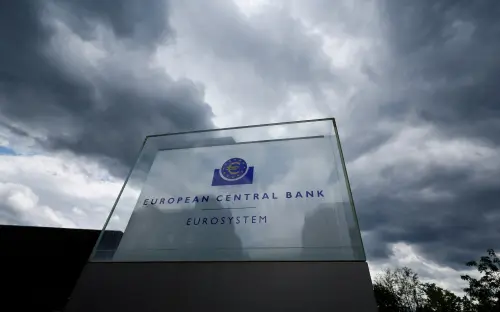LONDON, March 3 (Reuters) - The European Central Bank is expected to reduce rates once more on Thursday, with investors currently uncertain about what may come next.
The escalation of U.S. tariff risks, potential impacts from a new German government, a possible Ukraine ceasefire, and an anticipated rise in defense spending are factors that the ECB may need to address. Policymakers are now divided on the pace at which rates will be lowered moving forward.
According to Zurich Insurance Group's chief market strategist Guy Miller, "It's no longer a case of automatic pilot, reducing rates at every meeting."
Here are the five crucial questions facing the markets:
1/ What action will the ECB take on Thursday?
The ECB is anticipated to lower its key rate by another 25 basis points to 2.50%. Market focus will also be on the evaluation of financing conditions, which could provide insight into the post-March rate outlook.
ING's global head of macro, Carsten Brzeski, emphasized the importance of assessing whether ECB policy remains restrictive or is moving towards a more neutral stance.
Comments on the repercussions of the ECB payment systems issue from last week might be another area of interest.
2/ Will rate cuts persist beyond March?
Markets are projecting further rate cuts, expecting a somewhat turbulent trajectory ahead. The forecast includes three additional cuts to bring rates to 2% by year-end, with a possibility of a fourth cut to 1.75%. This aligns with the ECB's estimated range that does not overly stimulate or restrict growth, set between 1.75% and 2.25%.
While many policymakers seem to align with market expectations, discussions on the pace of adjustments are gaining momentum.
3/ How will the ECB evaluate the impact of tariffs thus far?
Given that only a 10% U.S. tariff on aluminum has been implemented, the ECB is not likely to factor tariffs into its policy decisions yet.
Regarding potential tariffs on European imports, the impact remains uncertain, with various scenarios proposed by U.S. President Donald Trump. Analysts suggest that the ECB will wait until April to assess the situation.
4/ How would a Ukraine ceasefire affect the ECB?
A ceasefire in Ukraine could marginally support the economy and potentially decrease energy prices. However, economists anticipate that the impact on the ECB's policy decisions might be minimal compared to the effects of tariffs.
5/ What are the expectations for the latest ECB projections?
Forecasts for growth heading into late 2024 are lower than those from December, indicating a probable downgrade to growth projections for the third consecutive time. Additionally, with energy prices increasing, a slight upward adjustment to this year's inflation projection is likely.
